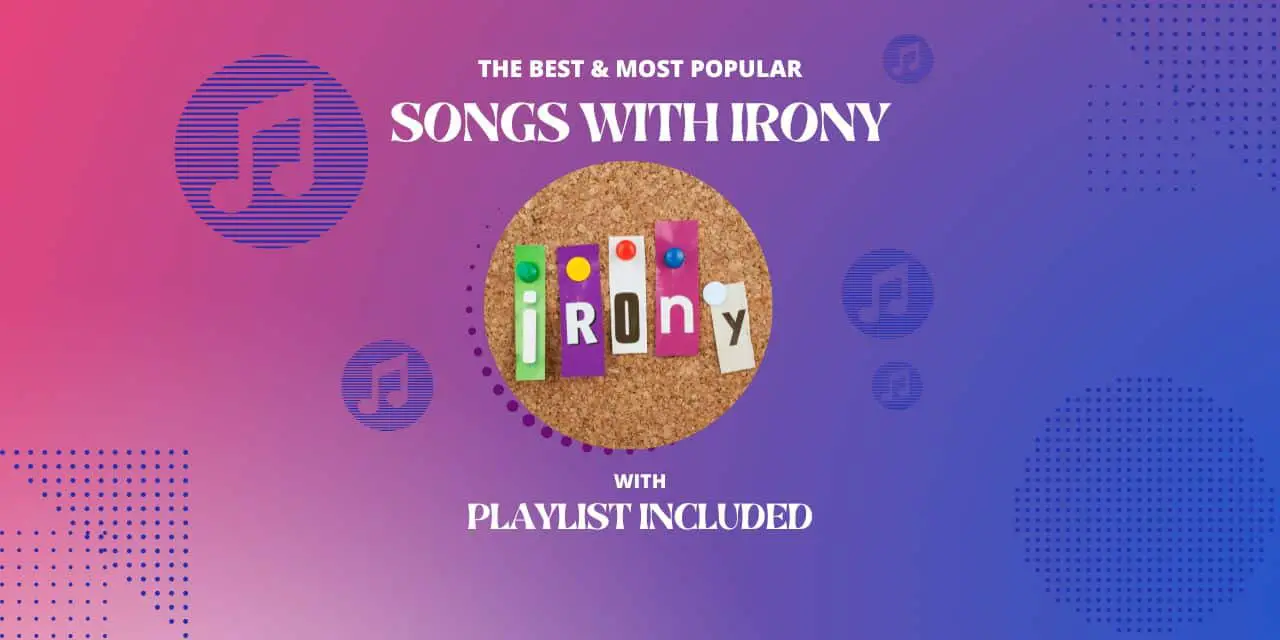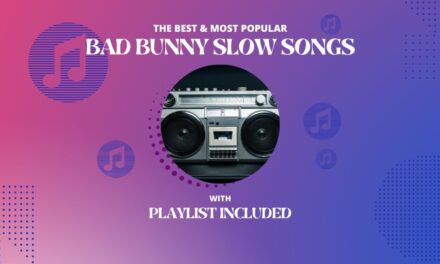Irony is often called the spice of life. It’s the subtle art of conveying a message that is completely opposite to what’s being said. For music enthusiasts, it’s an intelligent way to express oneself while tickling the fancy of the audience. No doubt, irony is a tricky device to master, but when the right artist strikes the pen in just the right way, it becomes a masterpiece.
So, let’s take a look at some songs that have used irony in creative, innovative ways that will leave you humming and hopefully examining the hidden subtexts behind the lyrics.
“Ironic” – Alanis Morissette
The song by a Canadian singer Alanis Morissette is said to be ironic, but is it really? The song describes a series of unfortunate events but in the end, the only thing that is truly ironic is the title itself.
Morissette tells a story of unexpected coincidences and strange twists of fate in a way that can leave the listeners confused and surprised. The clever use of words in the song creates a sense of doubt and complexity which adds to the overall feeling of perplexity.
“Don’t Worry, Be Happy” – Bobby McFerrin
“Don’t Worry, Be Happy” by Bobby McFerrin is an ironical song that makes light of the very human experience of hardship and worry. The gentle, upbeat melody serves as a contrast to the existential irony of the lyrics, in which McFerrin suggests that one can overcome the obstacles in life simply by adopting an attitude of happiness.
The song’s message, though simplistic, is delivered with a playful sense of irony that highlights the absurdity of thinking that happiness can be achieved through sheer force of will.
“Everybody Hurts” – R.E.M.
R.E.M.’s melancholic hit “Everybody Hurts” showcases a deceptive scenario of sadness. Through its emotive rock balladry, the song betrays a society-built irony in which everyone, regardless of their social or economic position, experiences emotional distress and isolation.
R.E.M. achieves this understanding by blending an evocative vocal delivery with sensitive instrumentation, culminating in a layer of raw emotions embedded in a message of hope.
“The End of the World as We Know It (And I Feel Fine)” – R.E.M.
R.E.M.’s track about irony doesn’t transparently reveal its purpose. The verses progress through unrelated and surprising scenarios that all end in an unexpected way.
The chorus, “It’s the end of the world as we know it, and I feel fine,” regards the apocalyptic nature of the earlier lyrics in an apparent disconnect, impressing upon the listener the irony of a person who is unbothered in an utterly terrifying time.
“Loser” – Beck
The song, musically driven by blending lo-fi, folk, and hip-hop, revolves around a narrator who is trapped in a cyclical pattern of self-indulgent behavior and self-pity.
Although the chorus touts themself as a “loser,” the verses reveal an entitled, self-serving perspective that eschews personal accountability while simultaneously demanding respect and admiration from others.
“Mad World” – Tears for Fears
The mellow yet haunting “Mad World” by Tears for Fears explores the paradox of feeling disconnected in a world that is bustling with life. The ballad’s melancholic melody and introspective lyrics are laced with a sense of ironic despair, as they shed light on the plight of someone who is struggling to make sense of the world around them.
The song’s understated yet poignant delivery is further accentuated by its poignant use in the film “Donnie Darko”, which adds an extra layer of meaning to this already thought-provoking track.
“Another One Bites the Dust” – Queen
The Queen’s “Another One Bites the Dust” is a textbook example of a song that is soaked in dramatic irony. The upbeat tempo, lively bassline, and crisp vocals may initially induce the listener to believe that the song projects a mood of confidence and self-assuredness.
However, the song’s lyrics narrate a completely different story, describing a man who’s life is falling apart. The juxtaposition between the apparent energy of the song and the somber, ironic lyrics creates a conflict in the listener’s mind, making it a masterful piece of irony that defies the norms of its musical style.
“You Can’t Always Get What You Want” – The Rolling Stones
The tune, from the legendary rock band The Rolling Stones, may sound like an upbeat celebration of indulgence and recklessness on the surface. However, upon deeper investigation, the lyrics render a contrasting portrayal of the seldom disappointed yearning for life’s true treasures juxtaposed with the materialistic desires of a consumerist society.
A significant portion of its irony is embedded within the chorus’s refrain, where the singer repeatedly emphasizes what one cannot always obtain.
“Money for Nothing” – Dire Straits
“Dire Straits’ hit song about the rock star lifestyle, ‘Money for Nothing’, delivers a sense of irony through its catchy guitar riff and upbeat tempo. The song satirically showcases the rock star’s glamorous and arrogant behavior, while also being self-critical of the industry that created them.
Interestingly, the song’s lyrics were misinterpreted by some as being homophobic, due to its use of slang language, illustrating the irony of how even well-meaning artists can be misunderstood and their message lost in translation.”
“Born in the U.S.A.” – Bruce Springsteen
The widely popular song from Bruce Springsteen, “Born in the USA”, may seem patriotic at first listen, but upon closer inspection, ironic undertones are evident in the lyrics. The narrator talks about being mistreated by his country, leading to his feelings of disillusionment and disconnection from the idea of the American Dream.
The song serves as a commentary on the poor treatment of Vietnam War veterans by society, and a brash critique of American exceptionalism and nationalism.
“American Idiot” – Green Day
“American Idiot” by Green Day is a charged political song that uses irony to criticize the state of American society. The song’s upbeat, catchy melody creates a sense of irony as it highlights themes of complacency and disillusionment. The band’s use of biting lyrics and punk rock sound represents a cynicism of the government and political culture of the time.
A political anthem that expresses the disillusionment of a generation that yearned for social change, “American Idiot” remains one of the most stirring demonstrations of the power of irony in music.
“Life In The Fast Lane” – Eagles
It’s easy to mistake the fast life for success, which is exactly what the Eagles do in “Life in the Fast Lane”. Despite the upbeat guitar riffs and catchy chorus, the song is full of irony. The lyrics recount the tale of a couple venturing into fast lane living, but despite their material possessions, they crash and burn, left with nothing.
The song uses its upbeat sound to highlight the dark themes of greed, excess, and the dangers of living too fast.
“Big Yellow Taxi” – Joni Mitchell
Joni Mitchell’s “Big Yellow Taxi” is a masterful musical composition steeped in ironic undertones. Despite the upbeat tempo and jaunty melody, the song is a powerful critique of the rampant commercialization and environmental destruction of modern society.
The seemingly harmless phrase “they paved paradise and put up a parking lot” belies a deeper message about the loss of natural landscapes and habitats. Mitchell’s poignant lyrics are an important reminder of the urgent need to protect the planet from human greed and exploitation.
“The Freshmen” – The Verve Pipe
This song, performed by The Verve Pipe, tells a story of a group of college freshmen who experience the harsh reality of adult life and regret not living in the moment. The irony comes from the fact that these students, who should be living the “best years of their lives,” are instead struggling with difficult and often depressing issues.
The profound lyrics, combined with the bouncy and upbeat melody, create a contrast that makes the listener feel both perplexed and captivated.
“Semi-Charmed Life” – Third Eye Blind
The song is a prime example of an ironic tune. It has upbeat melodies and a fast tempo that contradicts the darker lyrics about addiction and despair. The combination creates a sense of confusion and unpredictability that forces listeners to confront the contrast between the cheerful instrumental and serious lyrics.
The chorus, with its catchy repetition of “I want something else, to get me through this semi-charmed kind of life,” only adds to the complexity. It’s no wonder that the song is both widely popular and elusive in meaning.
“Pumped Up Kicks” – Foster the People
The track in question is an upbeat melody with poetic yet obscure lyrics alluding to an unexpected theme, the juxtaposition of a carefree melody contrasting a dark subject. Foster the People’s “Pumped Up Kicks” tells the story of a school shooter.
With its catchy chorus and peppy riffs, the song’s anti-hero perspective forces listeners to grapple with their own perspective and societal ills. Combining a gleeful sound with an alarming topic, the song exemplifies irony in music, leaving fans both perplexed and captivated.
“Bullet” – Hollywood Undead
A song that has perplexed many for its ironical theme is the work of Hollywood Undead named “Bullet”. The melody, packed with a lot of energy, narrates the story of a man who’s trying to end his life, with lyrics that paradoxically describe the pain of it.
Even though the song’s upbeat tempo appears to depict happiness, its lyrics reveal a darker meaning, which is the opposite of what one would expect from the sound’s vibrant and contagious beat.
“Love Stinks” – The J. Geils Band
“Love Stinks” by The J. Geils Band is a poignant musical commentary on the complex nature of love and relationships. The song’s ironic title belies the anguish and heartbreak that it describes, with lyrics that reflect a bitter and disillusioned perspective on the emotional turmoil often associated with romantic entanglements.
The track’s driving beat and soaring guitar riffs lend it a sense of urgency and energy, perfectly complementing the raw emotions on display. It is this combination of irresistible hooks and affecting lyrics that has made “Love Stinks” an enduring classic, a powerful reminder of the joys and pains of love.
“Tears in Heaven” – Eric Clapton
Eric Clapton’s “Tears in Heaven” is a solemn and emotional ballad that was written as a tribute to his young son Connor, who tragically passed away in a fall from a high-rise building.
The song’s irony stems from its ethereal, almost lullaby-like quality that contrasts starkly with the tragic subject matter and heart-wrenching emotions that Clapton conveys through his mournful lyrics and soulful guitar playing. It is a powerful example of how music can use irony to provoke introspection and connect with audiences on a deeply emotional level.
“Fast Car” – Tracy Chapman
“Fast Car” by Tracy Chapman tells the story of a woman trying to escape poverty by leaving her small town. What makes it ironic is the contradiction between the narrator’s dreams and her reality. Despite her insistence that her fast car will lead to a better life, she continues to struggle with poverty and unable to fully escape her circumstances.
The irony lies in the fact that her escape plan is thwarted by circumstances beyond her control, and the very thing she thought would set her free becomes a symbol of her unfulfilled aspirations.
“No Surprises” – Radiohead
“No Surprises” by Radiohead is a perfect blend of melancholy and irony. The song paints a picture of a seemingly perfect life that, upon closer inspection, is actually full of emptiness and loneliness.
With soft, dreamy music and bleak lyrics, the song contrasts the superficially happy facade with the hidden reality underneath. The lyrics are eerily relevant even today, as many people strive for the ideal image presented to them, only to realize that it doesn’t lead to contentment.
“No Surprises” masterfully captures the irony of a life that looks pretty on the surface but is ultimately unsatisfying.
“Landslide” – Fleetwood Mac
Fleetwood Mac’s “Landslide” is a poignant ballad delving into conflicted feelings about growing older. It entails bittersweet reflection for the end of youth, a looming uncertainty for the future and contemplation of the things we may lose in hindsight.
The lyrics are considered ironic due to the contrast between the steady and dense production with the melancholic story it tells. The song’s deeply emotive and introspective musings are wistful yet hopeful, and resonate throughout all generations.





